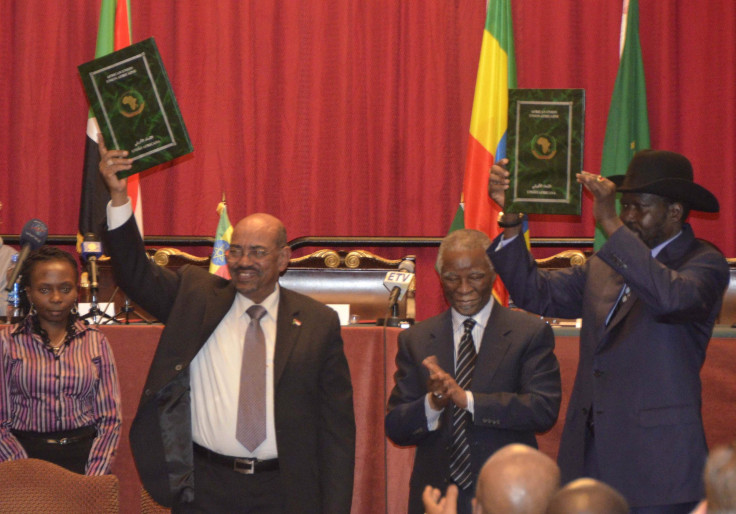Sudan, South Sudan Agreement Is Promising Despite Many Loose Ends

Despite a history of persistent and intractable conflict, Sudan and South Sudan reached an accord on Thursday that is expected to restart the two countries’ oil trade and temporarily resolve complicated border disputes.
Sudan and South Sudan have been at odds for decades, even before they officially split from each other to become two sovereign nations on July 9, 2011. In the long journey toward reconciliation, Thursday’s agreement is only a single step forward -- but it’s a big one.
The talks between South Sudan President Salva Kiir and Sudan President Omar al-Bashir began on Sunday in Addis Ababa, Ethiopia. It was the first time the two dignitaries have held formal discussions in more than a year.
The two countries have now agreed on a plan of revenue-sharing for oil wealth, as well as the establishment of demilitarized zones as a temporary fix for violence in volatile border zones.
“We are convinced that what has happened, which culminated in signing of the agreements, constitutes a giant step forward for both countries," said African Union mediator Thabo Mbeki, according to Reuters.
Fueling Progress
The oil agreements are a major achievement; both countries are in dire need of the revenue that could be generated by the region’s abundant crude reserves.
When South Sudan broke away last year, it took most of the country’s oil fields with it. Sudan retained the pipelines needed to transport -- and essentially monetize -- the fuel. Amid disagreements over crude transport fees and allegations of overdue payments, South Sudan shut down its oil production in January.
Suddenly, daily production of about 350,000 barrels of oil were shuttered, taking an immense toll on both countries’ undiversified economies.
Sudan saw skyrocketing inflation and was forced to implement public-pinching austerity measures. South Sudan, also slammed by inflation, found itself unable to afford much more than national defense, leaving infrastructure in the world’s youngest nation miserably inadequate.
That prompted both countries to come to an agreement on transport fees and other payment issues last month. Now that some border issues have also been settled during this week’s talks, the two presidents have agreed to restart oil production and exportation.
Picking Sides
The border between Sudan and South Sudan is heavily disputed, and this week’s talks haven’t changed that. But both Kiir and Bashir agreed that it was necessary to stop the military brinkmanship that has precluded a peaceful resolution.
Thursday’s agreement, therefore, includes a 6-mile demilitarized zone between the two nations.
Still, there is much to be negotiated, including ownership of five disputed border areas -- no protocol for resolution was outlined at this week’s meeting.
The most contentious of these zones is called Abyei. Both sides claim ownership of this oil-rich region and have failed to come to a peaceful consensus on the issue via referendums, as had been planned during negotiations surrounding South Sudan’s secession.
On Thursday, Salva Kiir lamented the fact that no agreement on Abyei was reached this week.
“Unfortunately, my brother Bashir and his government totally rejected the proposal on Abyei in its totality,” he said, according to Agence France-Presse.
Other border disagreements also remain, and they are complicated by a variety of factors: displaced persons on both sides, contested territorial claims and seasonally migrating tribes that habitually cross from one side to the other.
South Sudan’s spokesman Atif Kiir said that these issues will be resolved in later talks between the two countries.
“For the border issues, we had agreed that we are going to continue our talks, and we are hopeful to reach an agreement for the peace and security of the two countries, for the peace of the two regions and for the international community,” he said, according to CNN.
Reaching Resolution
Without a border agreement, lasting peace between Sudan and South Sudan is still a long way off.
And that’s not the only tough issue that remains. There are still humanitarian crises unfolding in South Kordofan and the Blue Nile State, regions within Sudan where conflicts still erupt between loyalists of both countries or between Sudanese troops and alleged South Sudan-allied militants. As a result of these conflicts, refugee camps along the border are overflowing with people trying to escape the violence.
With so much yet to negotiate and address, Thursday’s accord is by no means a complete success.
But the agreement on a resumption of oil production is a huge step in the right direction. Neither Kiir nor Bashir can pursue domestic development without a reliable base of revenue, and Thursday’s deal will reopen the pipelines to deliver the funds whose absence has devastated the quality of life in both countries.
As progress continues, the international community will continue to play a big role in the peace process. After all, Sudan and South Sudan are major suppliers of non-OPEC crude. Amid turmoil in other oil-producing regions around the world, stability here is of interest to virtually all oil-importing nations.
According to a report from Thursday's Financial Times, foreign investments are rolling into Sudan and South Sudan on the prediction that a strong output of valuable resources is inevitable.
And so -- even though Thursday’s agreement is decades in the making, even though a future disagreement could render this week’s negotiations moot and even though there are still myriad issues yet to be resolved -- economic concerns may become the glue that binds both Sudans together in the long run.
© Copyright IBTimes 2024. All rights reserved.












